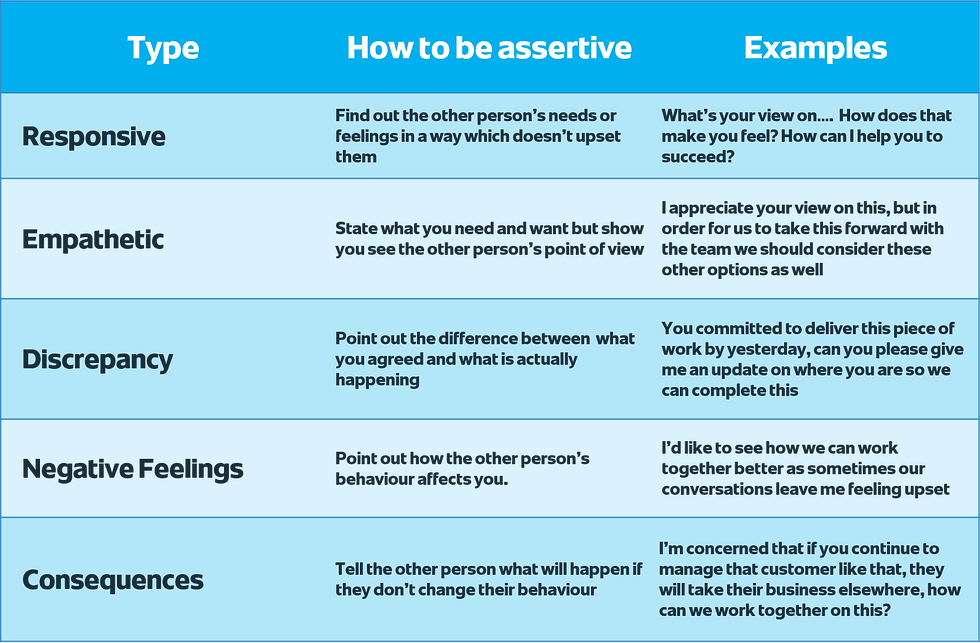My 7 steps to personal effectiveness - Step 4; Assertiveness
- HR.Blogger
- Jun 18, 2020
- 3 min read
Introducing step 4 in my personal effectiveness journey - Assertiveness.

I have always found showing assertiveness in the workplace to be tricky. Use too much and you’ll seem aggressive; use too little you’ll seem a pushover. But without healthy assertiveness, communication and teamwork can’t thrive. Put simply, being assertive is a happy medium between the two extremes of aggressive and passive.

Assertiveness is effectively, respectfully, and confidently communicating what you want, don’t want, or your opinion. People who practice assertiveness tend to be less anxious, depressed, and more satisfied with their relationships.
Assertive people understand the value of making their desires and beliefs known, but their pride isn’t damaged if their solution isn’t the one that comes out on top.
How to be assertive?
I have come across many different ways in which you can be assertive in and out of work. Here is a handful which I have found to be most useful:

If you’re not comfortable using any of these techniques, you can always make your own. I have found that there are many ways to be assertive without fitting a single rule. The fact is that it's good for everyone when all team members feel heard and respected
Speaking up is difficult for a lot of people. But it’s good for everyone when all team members feel heard and respected. Personally I found it tough at first, but it definitely got easier with practice as I became more confident.
My top tips for becoming more assertive;
Get to the point & keep it simple - express your ideas clearly & concisely.
Be firm, yet always polite! - being assertive means you value your own thoughts, feelings, and voice as well as those of others. You don't have to be a jerk!
Time your intervention - think about when to best get your point across.

Look for Win-Wins - look for positive solutions that could work well for everyone. This means you have to be open to feedback!
Be curious, ask questions - listen to understand (not necessarily agree), and get people thinking in a different way.
Don't apologise for having your opinion - as long as it is fair and rational. Aim for respect, not friends.
Start small - it is important to practice. Small victories will build up your confidence and help you feel empowered.
Celebrate your successes - when you achieve something important, don't keep it to yourself. You don't want to brag too much, but recognising your achievements is important to build your self-confidence and help you feel your own value.
Volunteer yourself - this is a great way to show off the range of your skillset but also gives a chance to test out your assertiveness in a temporary environment.
Lead with your feelings - phrasing can really help make being assertive easier. Always try and lead with the way somebody is making you feel - no one can argue with your own feelings. Therefore use 'I' statements such as "I feel, I think, and I believe..."
Understand the impact of your words - your words create the reality of the situation. Ensure that you use the right empowering language e.g. "thank you for your patience" rather than "sorry for the delay" and "when can I expect" rather than "I just wanted to check-in."
Say “and” instead of “but” - the simple act of replacing the word “but” with “and” makes conflict much more constructive and collaborative. Using the word "but" in a sentence devalues an idea. Saying "and" makes the other party feel like you're working with them, rather than against them.
But most importantly...... Jump in - At some point you’re going to have to ask that question in the meeting, or trust your judgement and voice your opinion to colleagues. If possible, think about the questions or topics of the meeting beforehand, and then jump in. It can seem scary, but the sooner you embrace your fears and give it a go, the quicker your nerves will start to fade, the more confidence you’ll have and the easier you’ll find being assertive. And people will respect that.
I hope you found this article useful, and may you have the courage to be assertive starting from now!
Stay safe and stay tuned for step 5 :-)
HR Blogger









Comments